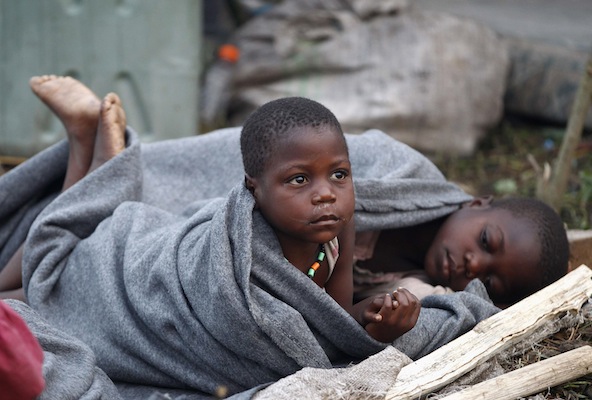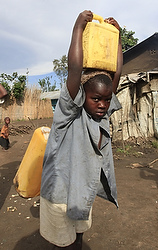
Five years after leaving his native country of Congo, Celestin and his family of eight arrived in Arizona July 24 as refugees. Two months later the former secondary school teacher was still without a job.
His children settled well into school. The family has housing, but Celestin was getting used to the heat and rules for American tenants.
“The big problem is rent because in Congo, one to five months can pass if you don’t have the money,” Celestin said in perfect English.
He quickly learned that if rent isn’t paid on time in the U.S., a notice to evict is only a day or so away. Celestin is eager to become self-sufficient. He noted the Chinese proverb about giving a man a fish versus teaching him to fish.
“I cannot continue to accept that people give me a fish,” Celestin said.
He is grateful for the help so far: laundry service, a local food bank, rides to church from the local Congolese community. More than 1,200 have resettled in Arizona since 1999.
Catholic Charities Community Services was there to meet Celestin and his family at the airport and volunteers with the Scottsdale-based Welcome to America Project furnished their three-bedroom apartment and supplied other necessities such as kitchenware, linens and cleaning supplies.
“We visit newly-arriving families on a weekly basis to offer these items, and a warm welcome with a team of energetic and hospitable volunteers,” O’Connor said.

They visit one to three families each week, but O’Connor noted that the organization reaches single adults too. Sometimes they’re in the most difficult place, emotionally, she said. At least 90 percent of refugees Welcome to America Project visit say they left a close relative in a war zone or refugee camp. Others were separated somewhere amidst the chaos.
“It’s better to be going through a big change with your family support and comfort nearby,” O’Connor said.
Celestin and his family were fortunate. They left the Congo in 2008 and lived in two other places including at least once as urban refugees before coming to the U.S. The family is grateful for American support.
“They did good for me. I’m happy,” Celestin said from the comfort of his newly acquired couch.
It was pink and blue plaid. His youngest daughter, a kindergartener, sat in a sleeveless, light pink dress coloring nearby while watching a children’s television channel.
Megan O’Connor, executive director of Welcome to America Project, said donations of televisions are among the more vital gifts it can give the 1,000 families served each year. It helps families learn English.
Volunteers help in a variety of other ways too. They assist with home visits, packing, deliveries, storage upkeep, in the clothes closet or in the office. Welcome to America Project supplied local refugees with nearly 19,350 pieces of clothing last year.
There are also indirect ways to support local refugees including a “No Passport Required” dinner series. The next one is Oct. 20 at Prince of Peace Lutheran Church in East Phoenix and it celebrates the Congolese culture through food and music.
The U.S. has already settled nearly 11,000 Congolese refugees since 2001 — the same year a local Catholic founded the Welcome to America Project. Arizona is one of the top-receiving states for Congolese refugees and expects to welcome more in the next five years.
Agencies such as Catholic Charities and International Rescue Committee try to help families become self-sufficient within six months. The support of ethnic-based and faith-based groups plus others in the community is vital, said Megan O’Connor, executive director of Welcome to America Project.
Congolese Cultural Dinner
6 p.m. Oct. 20 at Prince of Peace Lutheran Church, 3641 N. 56th St.
Info: www.wtap.org or (602) 490-0088






